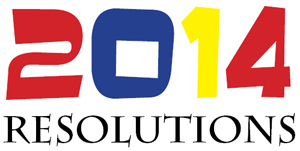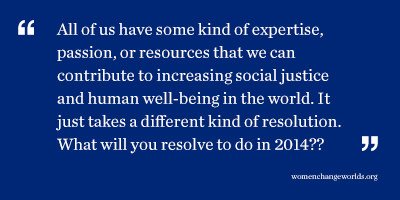
This time of year, many people are thinking about their New Year’s resolutions. More often than not, these resolutions revolve around things we’d like to change in ourselves or our lives. But what about the things we’d like to change about our world--the things that are bigger than ourselves and our own individual lives? This year, I’m advocating for a different kind of resolution--a resolution to connect ourselves to “the change we’d like to see in the world” through direct action in areas we have the power to influence. I’m convinced that, if enough of us did this, we would turbo-charge not only efforts towards social justice but also human well-being on a vast scale. Are you ready to see where you can plug in??
Those of us who work at social change organizations, like us here at the Wellesley Centers for Women, perhaps have it easiest because our very livelihood depends on doing work that makes a difference in the world. Yet, even those of us who work in this arena need to recommit periodically--to our ideals and principles, to our social change goals, to the targets for change that we have set and to which we hold ourselves accountable. At WCW, we are using a strategic planning process to help us do this, which requires us both organizationally and individually to look at our work--which includes research, theory, and action programs--and its social change impact. Even those of us who have chosen social justice or human wellbeing as our lifework must periodically review, refresh, and reinvigorate.
 Just because we don’t all work for social change organizations, however, doesn’t mean there aren’t major ways we can make each a difference. What do you care about? What change would you like to see in the world? As great and necessary as organizations are in the social change equation, they are not the end-all and be-all. Individuals and small groups, even when they are working for change outside formal organizations, can make a monumental difference in outcomes for many through partnering, advocacy, endorsement, and financial support. As Margaret Mead once famously quipped, “Never doubt that a small group of thoughtful, committed citizens can change the world; indeed, it is the only thing that ever has.”
Just because we don’t all work for social change organizations, however, doesn’t mean there aren’t major ways we can make each a difference. What do you care about? What change would you like to see in the world? As great and necessary as organizations are in the social change equation, they are not the end-all and be-all. Individuals and small groups, even when they are working for change outside formal organizations, can make a monumental difference in outcomes for many through partnering, advocacy, endorsement, and financial support. As Margaret Mead once famously quipped, “Never doubt that a small group of thoughtful, committed citizens can change the world; indeed, it is the only thing that ever has.”
Yet, the “power of one” is something to be reckoned with, too. We can look to history for inspiration. I would tell my students, for example, about an African-American “house slave” named Milla Granson who held a “midnight school” in her cabin each night to teach 12 fellow slaves how to read; once they learned, she took in 12 more--and did so for decades, until scores “forged their passes to freedom.” Can we imagine this kind of educational activism today? Just last week, I learned the story of Chiune Sugihara, the Japanese diplomat in Lithuania who, during the Holocaust, without orders, wrote and distributed transit visas, sometimes working in collaboration with his wife for 18 hours per day, even overnight, to produce them. Today, scholars estimated that he saved about 6,000 Jews and that anywhere from 40,000 to 100,000 people are alive today because of the action he took. Both Milla Granson’s and Chiune Sugihara’s actions show us that there’s always something we can do, right from where we happen to be standing. So what are we waiting for?
All of us have some kind of expertise, passion, or resources that we can contribute to increasing social justice and human well-being in the world. It just takes a different kind of resolution. What will you resolve to do in 2014??
Layli Maparyan, Ph.D. is the Executive Director of the Wellesley Centers for Women and Professor of Africana Studies at Wellesley College.
When you subscribe to the blog, we will send you an e-mail when there are new updates on the site so you wouldn't miss them.
Comments